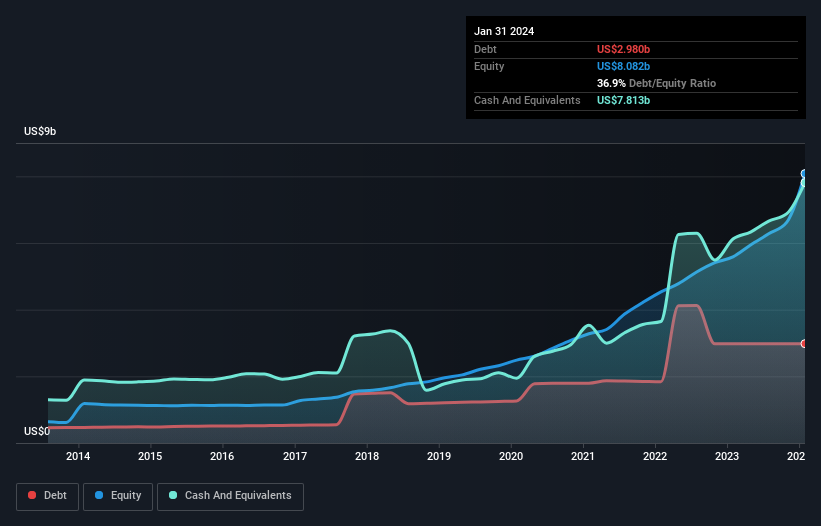Legendary fund manager Li Lu (who Charlie Munger backed) once said, 'The biggest investment risk is not the volatility of prices, but whether you will suffer a permanent loss of capital.' When we think about how risky a company is, we always like to look at its use of debt, since debt overload can lead to ruin. As with many other companies Workday, Inc. (NASDAQ:WDAY) makes use of debt. But the more important question is: how much risk is that debt creating?
Why Does Debt Bring Risk?
Debt is a tool to help businesses grow, but if a business is incapable of paying off its lenders, then it exists at their mercy. If things get really bad, the lenders can take control of the business. However, a more common (but still painful) scenario is that it has to raise new equity capital at a low price, thus permanently diluting shareholders. Of course, debt can be an important tool in businesses, particularly capital heavy businesses. When we examine debt levels, we first consider both cash and debt levels, together.
See our latest analysis for Workday
What Is Workday's Debt?
The chart below, which you can click on for greater detail, shows that Workday had US$2.98b in debt in January 2024; about the same as the year before. But on the other hand it also has US$7.81b in cash, leading to a US$4.83b net cash position.

How Strong Is Workday's Balance Sheet?
We can see from the most recent balance sheet that Workday had liabilities of US$5.06b falling due within a year, and liabilities of US$3.32b due beyond that. Offsetting these obligations, it had cash of US$7.81b as well as receivables valued at US$1.64b due within 12 months. So it actually has US$1.08b more liquid assets than total liabilities.
This state of affairs indicates that Workday's balance sheet looks quite solid, as its total liabilities are just about equal to its liquid assets. So while it's hard to imagine that the US$68.4b company is struggling for cash, we still think it's worth monitoring its balance sheet. Simply put, the fact that Workday has more cash than debt is arguably a good indication that it can manage its debt safely.
Although Workday made a loss at the EBIT level, last year, it was also good to see that it generated US$183m in EBIT over the last twelve months. There's no doubt that we learn most about debt from the balance sheet. But ultimately the future profitability of the business will decide if Workday can strengthen its balance sheet over time. So if you want to see what the professionals think, you might find this free report on analyst profit forecasts to be interesting.
Finally, while the tax-man may adore accounting profits, lenders only accept cold hard cash. While Workday has net cash on its balance sheet, it's still worth taking a look at its ability to convert earnings before interest and tax (EBIT) to free cash flow, to help us understand how quickly it is building (or eroding) that cash balance. Over the last year, Workday actually produced more free cash flow than EBIT. That sort of strong cash generation warms our hearts like a puppy in a bumblebee suit.
Summing Up
While we empathize with investors who find debt concerning, you should keep in mind that Workday has net cash of US$4.83b, as well as more liquid assets than liabilities. The cherry on top was that in converted 1,044% of that EBIT to free cash flow, bringing in US$1.9b. So is Workday's debt a risk? It doesn't seem so to us. Another factor that would give us confidence in Workday would be if insiders have been buying shares: if you're conscious of that signal too, you can find out instantly by clicking this link.
At the end of the day, it's often better to focus on companies that are free from net debt. You can access our special list of such companies (all with a track record of profit growth). It's free.
Valuation is complex, but we're here to simplify it.
Discover if Workday might be undervalued or overvalued with our detailed analysis, featuring fair value estimates, potential risks, dividends, insider trades, and its financial condition.
Access Free AnalysisHave feedback on this article? Concerned about the content? Get in touch with us directly. Alternatively, email editorial-team (at) simplywallst.com.
This article by Simply Wall St is general in nature. We provide commentary based on historical data and analyst forecasts only using an unbiased methodology and our articles are not intended to be financial advice. It does not constitute a recommendation to buy or sell any stock, and does not take account of your objectives, or your financial situation. We aim to bring you long-term focused analysis driven by fundamental data. Note that our analysis may not factor in the latest price-sensitive company announcements or qualitative material. Simply Wall St has no position in any stocks mentioned.
About NasdaqGS:WDAY
Workday
Provides enterprise cloud applications in the United States and internationally.
Flawless balance sheet with high growth potential.
Similar Companies
Market Insights
Community Narratives


Recently Updated Narratives


MINISO's fair value is projected at 26.69 with an anticipated PE ratio shift of 20x


The Quiet Giant That Became AI’s Power Grid


Nova Ljubljanska Banka d.d will expect a 11.2% revenue boost driving future growth
Popular Narratives


The company that turned a verb into a global necessity and basically runs the modern internet, digital ads, smartphones, maps, and AI.


MicroVision will explode future revenue by 380.37% with a vision towards success



